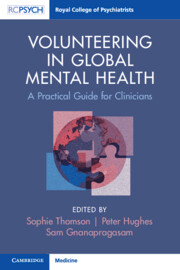Book contents
- Volunteering in Global Mental Health
- Reviews
- Volunteering in Global Mental Health
- Copyright page
- Contents
- Foreword
- Contributors
- Introduction
- Section 1 Key Principles, Theory and Concepts
- Chapter 1 Background and Principles of Volunteering in Global Mental Health
- Chapter 2 Humanitarian Emergencies
- Chapter 3 Ethical Issues in Global Volunteering: An Ethicist’s Perspective
- Chapter 4 Ethical Issues in Global Volunteering: Practical Considerations
- Chapter 5 Benefits of Global Volunteering to the United Kingdom
- Section 2 Practical Guide and Toolkit
- Section 3 Reflective Accounts and Perspectives of Global Mental Health Volunteering
- Section 4 Future of Global Volunteering
- Book part
- Glossary
- Index
- References
Chapter 2 - Humanitarian Emergencies
from Section 1 - Key Principles, Theory and Concepts
Published online by Cambridge University Press: 08 November 2023
- Volunteering in Global Mental Health
- Reviews
- Volunteering in Global Mental Health
- Copyright page
- Contents
- Foreword
- Contributors
- Introduction
- Section 1 Key Principles, Theory and Concepts
- Chapter 1 Background and Principles of Volunteering in Global Mental Health
- Chapter 2 Humanitarian Emergencies
- Chapter 3 Ethical Issues in Global Volunteering: An Ethicist’s Perspective
- Chapter 4 Ethical Issues in Global Volunteering: Practical Considerations
- Chapter 5 Benefits of Global Volunteering to the United Kingdom
- Section 2 Practical Guide and Toolkit
- Section 3 Reflective Accounts and Perspectives of Global Mental Health Volunteering
- Section 4 Future of Global Volunteering
- Book part
- Glossary
- Index
- References
Summary
Whenever there is a humanitarian emergency in the world, mental health workers in the UK and other regions may wish to offer their skills. For diaspora health workers it may be an even more agonising longing as they see news footage from their childhood and familial homes. However, unless the volunteer follows proper internationally accepted guidelines there is a risk that that same health worker will end up not just being unhelpful but becoming a burden on the relief effort. This chapter considers volunteering in humanitarian emergencies and related principles, and includes some personal reflections.
- Type
- Chapter
- Information
- Volunteering in Global Mental HealthA Practical Guide for Clinicians, pp. 22 - 27Publisher: Cambridge University PressPrint publication year: 2023

